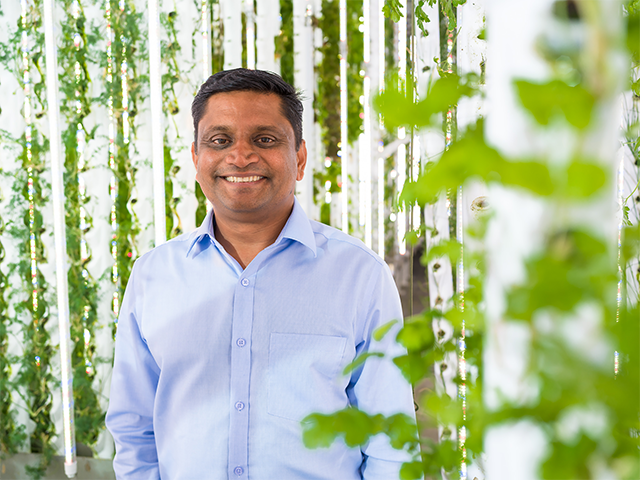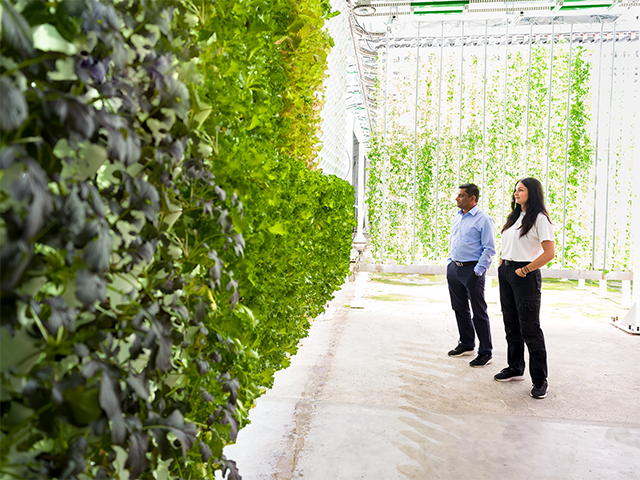Fresh, locally grown and sustainably produced dill, coriander and basil all year round. It may sound like a dream – but the company Deliplant is already producing these tasty and healthy leaves. The facility, which is located in Lövsta, has the capacity to produce around 50 tonnes per year, and the vision is to supply both Sweden and the world with herbs for use in food, supplements, medicines and cosmetics. Both the patented technology and other well-kept trade secrets are based on research from SLU.
The concept of vertical farming is several thousand years old. So you could say that Deliplant, which was launched by Sarosh Bejai Ramachandra in 2017, has a lot in common with the Hanging Gardens of Babylon, one of the ‘Seven Wonders of the World’.
“Many researchers are a bit shy and are content to write scientific papers. But I want to be a good example of the fact that you can achieve so much more, by taking the step to become an entrepreneur as well!”
From basement to 1,000 square metres
Sarosh Bejai Ramachandra is now the CEO of Deliplant, although his previous professional life at SLU was as a postdoc, research assistant and associate professor in molecular biology. He brought his former student Staffan Matzén into the company, which now has a further five employees.
Deliplant has gone from premises comprising a garage and basement, to having both a pilot facility at Kungsängen Farm and now also a thousand square metres on SLU’s site in Funbo-Lövsta – half of which is used for cultivation. The facility will be inaugurated this autumn by the Governor of Uppsala County, Stefan Attefall.
“He has shown great interest in the company, and is one of many valuable contacts we have made as a company representing SLU Holding. We have had the opportunity to present Deli Plant in a range of contexts, including to various EU ambassadors.”
The herbs and medicinal plants that Deliplant is continuing to research within the company have the potential to be used as food and in food supplements, medicines and cosmetics. Using high-resolution liquid chromatography in the company’s lab, the plants’ ‘fingerprints’ are being extracted, in the search for new, valuable metabolites or genes in the plants.
“However, we are also looking into the possibility of starting to grow plants such as strawberries, cherries, tomatoes, chillies and protein crops.”
Minimal environmental and climate impact
Bearing in mind that the concept of vertical farming is very old, what is unique about Deliplant?
“It’s all about an innovative farming system, where we are developing each and every part ourselves. The production process has minimal environmental and climate impact, and is extremely efficient. We are able to produce crops indoors all year round, close to our consumers. When we grow products vertically, we achieve 65 times the harvest in the same area compared to growing on a single level,” says Sarosh Bejai Ramachandra.
The patented automated conveyor system on a ceiling track handles everything from sowing to harvesting, with the help of three robots. The plants are planted vertically in tubes in a fully degradable coconut fibre bed, and are fed with synthetically manufactured nutrients. The recipe for optimum growth is one of many trade secrets. The wavelengths of the LED lighting are adjusted using AI according to the growth cycle in order to optimise the nutritional content and flavour of the herbs, to ensure that each batch is of the same quality. After being harvested every three weeks, the same plants can sprout new leaves and be harvested over and over again, for anything from six months to more than a year. This provides a return on investment more than twice as quickly compared to having to sow new plants after each harvest.
A future as a licence and technology provider
To date, Deliplant does not have its own complete AI system for all the processes, but the company has gathered a great many data points in order to develop specific algorithms.
“Our plan is to become license and technology providers to companies around the world that want to use our concept for local production. On the ground, all they then have to do is ‘press the basil button’ and we will continue to manage and check production from here in Sweden.”
Through Business Sweden, Deliplant has succeeded in establishing contact with stakeholders in Singapore, and there is a Memorandum of Understanding (a non-binding declaration of intent) with a company in Bangalore, India. Sarosh Bejai Ramachandra can see good opportunities to sell his concept to many countries, for example in the Middle East. China has shown considerable interest in the production of medicinal plants, which are produced entirely without pesticides in Deliplant’s concept.
“Our approach is a way of redefining vertical farming. On the one hand, we have developed all the parts of the system ourselves, thereby keeping costs down, while on the other, we have carefully analysed which production is profitable. Ten years ago, there was a great deal of hype around vertical farming in the USA. Large amounts were invested in Texas, for example, but the technology, which had been taken from the automotive industry, was very expensive. And the lettuce that was grown vertically could not compete with the large-scale local outdoor production already established there.”
Great support in major challenges
More than 90% of the herbs sold in Sweden are currently imported.
“But we are enjoying a good dialogue with wholesalers. We have also received extremely positive feedback from end customers such as caterers, restaurants and retailers, who can see great value in terms of sustainability and self-sufficiency. We also have high hopes when it comes to our contacts with the Odlarlaget cooperative, which helps Swedish fruit and vegetable producers to enter the market.”
With investors and partners such as Beijerinvest, Demosthenes and Karolina Ventures, Sarosh Bejai Ramachandra can see great potential in Deli Plant’s future. The support received from them and from SLU Holding has been absolutely crucial.
“I didn’t have any idea about business and business plans before. In 2015, I didn’t even know SLU Holding existed! But I found inspiration and experts to discuss ideas with at one of their seminars. Their business advisers have provided a great deal of advice and support, and I have also attended a highly instructive programme at Uppsala Innovation Centre. So far, it’s been a brilliant journey!”
Visit Deliplant´s website and learn more about their products and vertical farming system.



